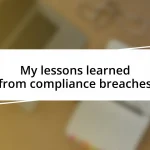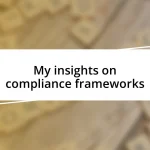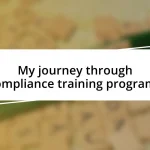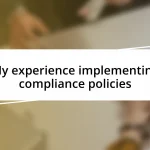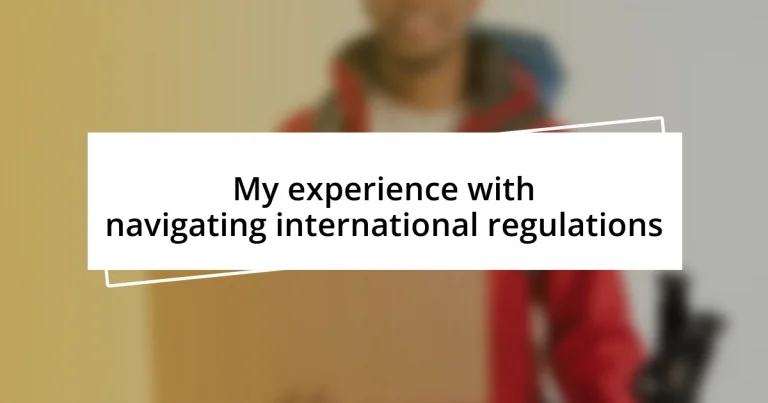Key takeaways:
- Understanding international regulations is essential for compliance and involves navigating unique country standards influenced by historical and cultural factors.
- Committing to compliance not only protects a company’s reputation but also enhances operational efficiency and opens new market opportunities.
- Staying informed through regular monitoring, professional networks, and leveraging technology is crucial for successfully managing the complexities of international regulations.
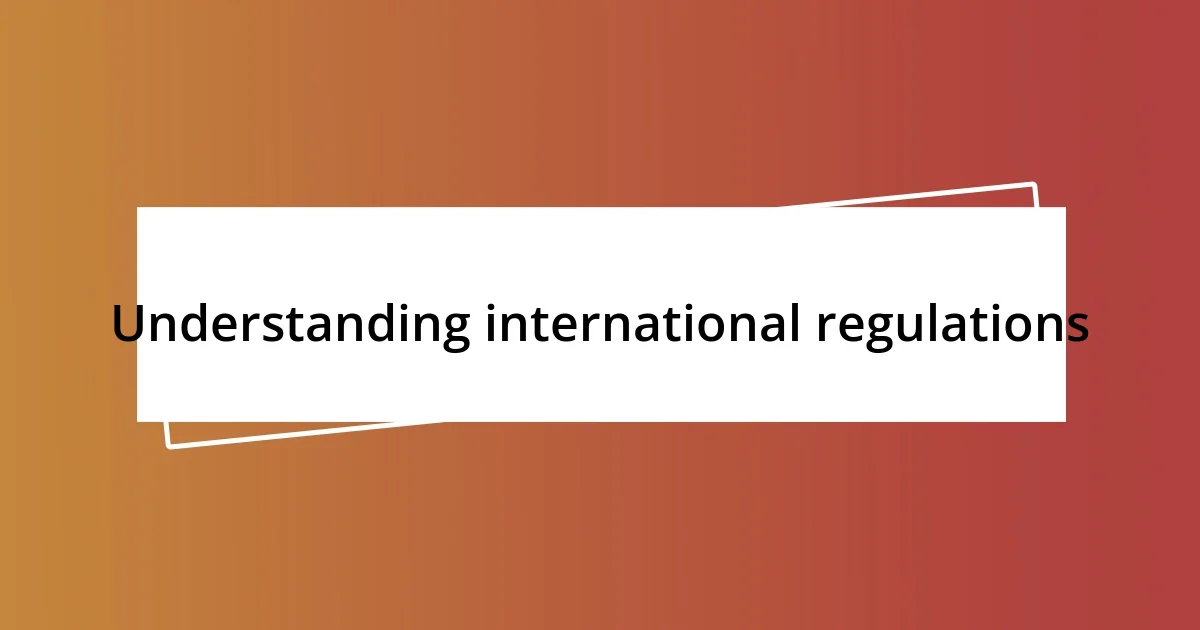
Understanding international regulations
Understanding international regulations can sometimes feel like navigating a complex labyrinth. I vividly remember my first encounter with these regulations during a project that required compliance with multiple country standards. The realization hit me: how can different nations have such unique regulations for the same industry? It’s a puzzle that often left me both intrigued and frustrated.
As I dove deeper, I found that international regulations often stem from historical, cultural, and economic factors that shape a country’s approach to trade and safety. For instance, I once worked with a client eager to enter the European market, only to discover that their product didn’t meet the stringent EU standards. It was an eye-opener that emphasized the significance of thorough research before venturing into new territories. Have you ever faced such a disconnect in compliance?
Moreover, the emotional aspect can’t be overstated. The pressure to ensure compliance while managing expectations from stakeholders can be overwhelming. I often felt like I was walking a tightrope, balancing between regulatory obligations and business goals. This experience taught me that understanding international regulations isn’t just about following the rules; it’s about fostering trust and building relationships across borders.
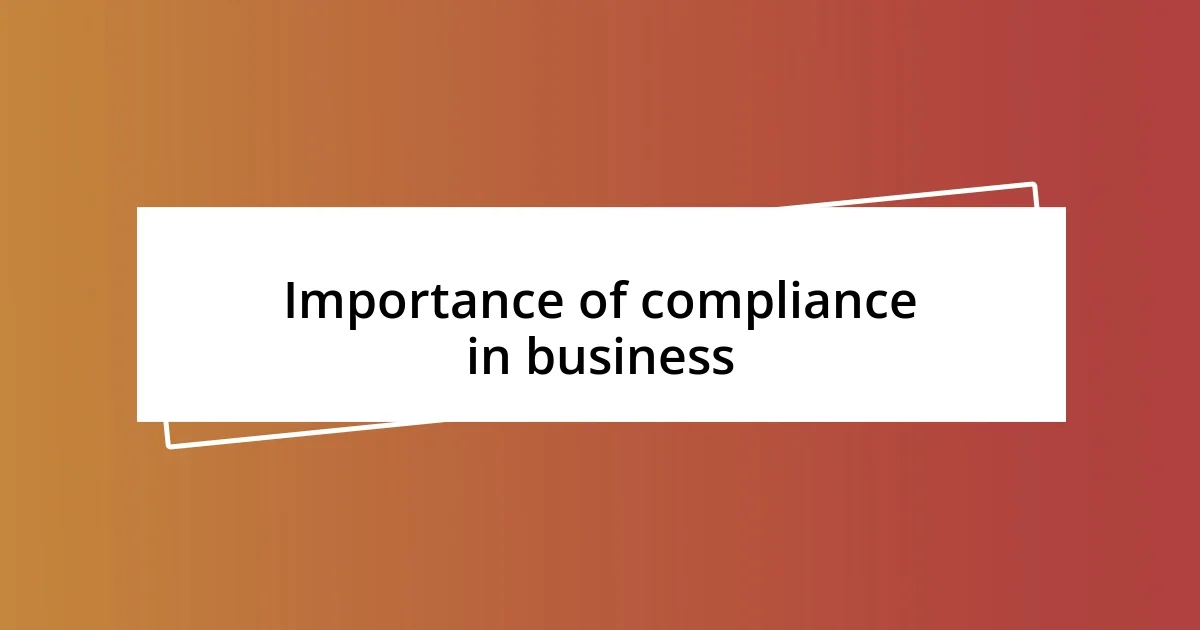
Importance of compliance in business
The role of compliance in business cannot be overstated. I’ve seen firsthand how adherence to regulations not only safeguards a company’s reputation but also fosters operational efficiency. During one of my ventures abroad, I observed how a local firm thrived by strictly adhering to industry standards, while others faced hefty penalties for neglecting them. This experience reinforced my belief that an organization’s commitment to compliance is pivotal for long-term success.
Consider these key points about the importance of compliance:
- Risk Management: Staying compliant helps identify and manage potential risks, preventing costly legal issues.
- Customer Trust: Meeting regulatory standards builds trust among customers, who feel more secure with compliant brands.
- Market Opportunities: Compliance can open the door to new markets, as many regions require proof of adherence before allowing entry.
- Enhanced Reputation: Firms known for their integrity often benefit from a stronger public image, essential for brand loyalty.
- Increased Efficiency: Compliance processes can streamline operations by reducing errors and enhancing consistency across functions.
Navigating the world of regulations might feel daunting, but I assure you, embracing compliance is one of the smartest business strategies you can adopt.
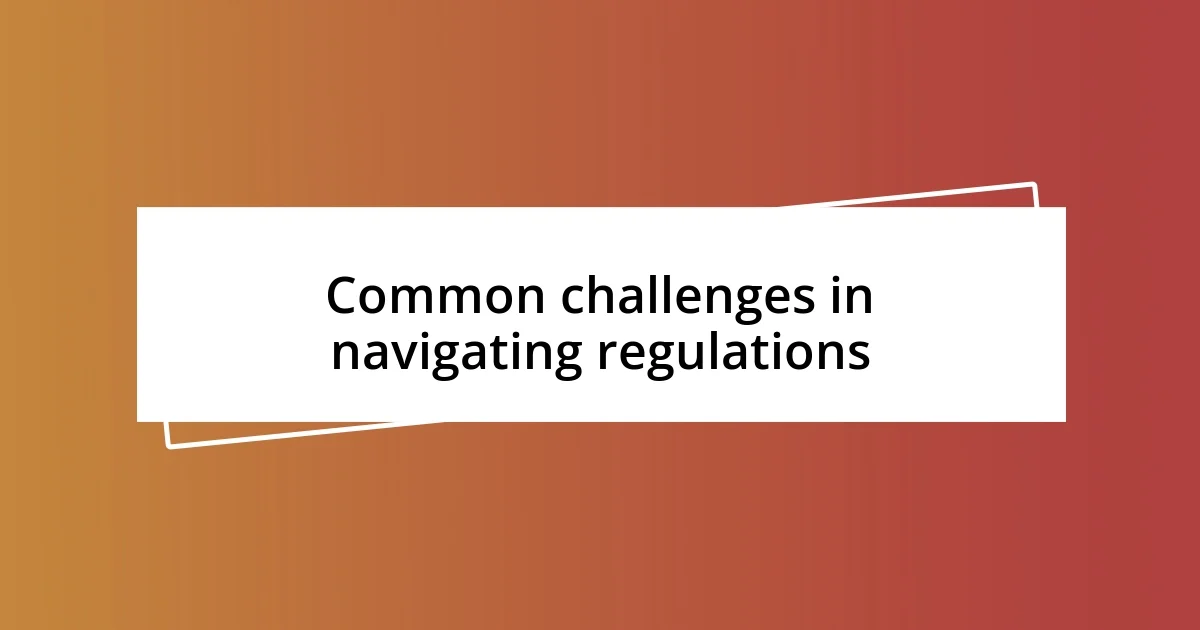
Common challenges in navigating regulations
Navigating international regulations often reveals a myriad of challenges that can leave even seasoned professionals feeling daunted. One common difficulty I encountered was the inconsistency between countries regarding documentation requirements. I remember a project where I thought I had everything prepared for customs clearance, only to find out that the documentation needed differed vastly from what I had used in the past. It was a frustrating moment that reminded me of the importance of meticulous preparation.
Another challenge that surfaces regularly is the language barrier. While working on regulatory compliance in a multilingual environment, I’ve felt the tension that comes with misinterpretations or jargon that simply doesn’t translate well. Once, I spent hours deciphering a regulation in French before realizing that a single word could change the entire context! It’s experiences like these that drive home how crucial it is to have local experts who can bridge that gap.
Finally, staying updated with constantly changing regulations can feel overwhelming. I’ve found myself in situations where new policies were implemented overnight, making previously compliant projects suddenly non-compliant. This volatility demands not only flexibility but also a dedicated effort to stay informed. I often wonder, how do others keep up with these changes? For me, regular interactions with industry peers and subscribing to regulatory newsletters has helped immensely.
| Challenge | Personal Experience |
|---|---|
| Documentation Discrepancies | Realizing different documentation requirements left me scrambling to meet deadlines. |
| Language Barriers | Deciphering regulations in another language was a daunting task that taught me the value of local expertise. |
| Constantly Changing Regulations | Overnight policy changes made compliance a moving target, highlighting the need for continuous learning. |
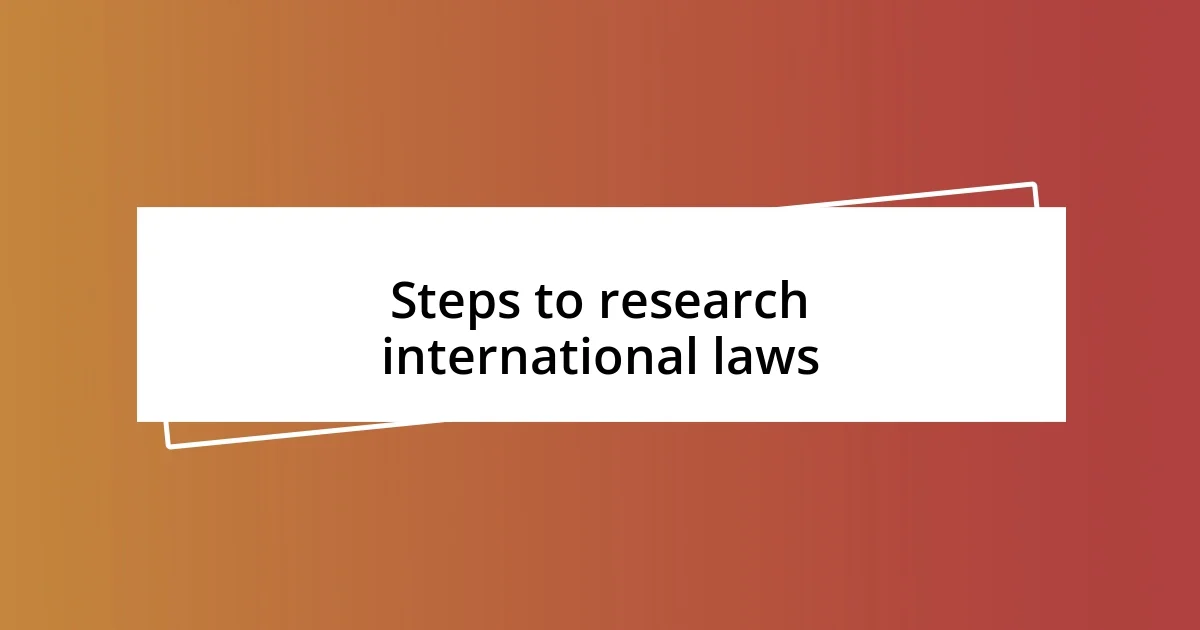
Steps to research international laws
Researching international laws can initially feel like tackling a massive puzzle. I usually start by identifying the specific jurisdiction relevant to my needs. I remember a project in Singapore where I had to quickly familiarize myself with local trade regulations. My first step was to sift through the official government websites, which provided up-to-date and authentic information. So, my advice? Always start with credible sources.
Once I have a grasp on the basics, I dig deeper by accessing international legal databases. Back when I was working on data transfer regulations, I explored platforms like Westlaw and LexisNexis. These databases offered invaluable insights into precedents and specific legal interpretations. It’s fascinating how much you can learn by simply analyzing case law related to your area of interest. Isn’t it amazing how the right resources can illuminate complex issues?
Finally, I believe engaging with local legal experts is essential. During a project in Brazil, I collaborated with a local attorney who helped clarify several nuances in environmental laws that I would have never caught on my own. The experience showed me the tremendous value of building relationships with professionals in each target market. It’s not just about getting the facts; it’s about understanding the context, too. What strategies do you find successful in your research? For me, these connections often make all the difference.

Best practices for staying informed
Staying informed in the ever-evolving landscape of international regulations is a challenge I take seriously. One practice that has proven invaluable is establishing a routine for monitoring updates. I block out time every week to scan through industry publications and regulatory bodies’ announcements. It’s a small yet effective commitment that has often saved me from costly oversights. Have you ever thought about how just a few minutes of reading can prevent major headaches?
Another strategy involves leveraging social media and professional networks. I often follow key thought leaders on platforms like LinkedIn, where insightful discussions unfold daily. I’ve been in countless scenarios where a single post would inform me of a regulatory change I hadn’t yet encountered. Just last month, a connection shared a new compliance guideline that completely altered my approach to a project. It’s fascinating how staying plugged in can lead to timely information that makes a real difference.
Lastly, I can’t stress enough the importance of joining professional associations or forums focused on international regulations. For instance, I’m a member of a global compliance group where members actively share their experiences and tips. The sense of community is nurturing, and I’ve learned so much from others’ setbacks and victories. Isn’t it reassuring to know there are others navigating the same waters? Connecting with peers in such spaces keeps my knowledge fresh and my approach adaptable.
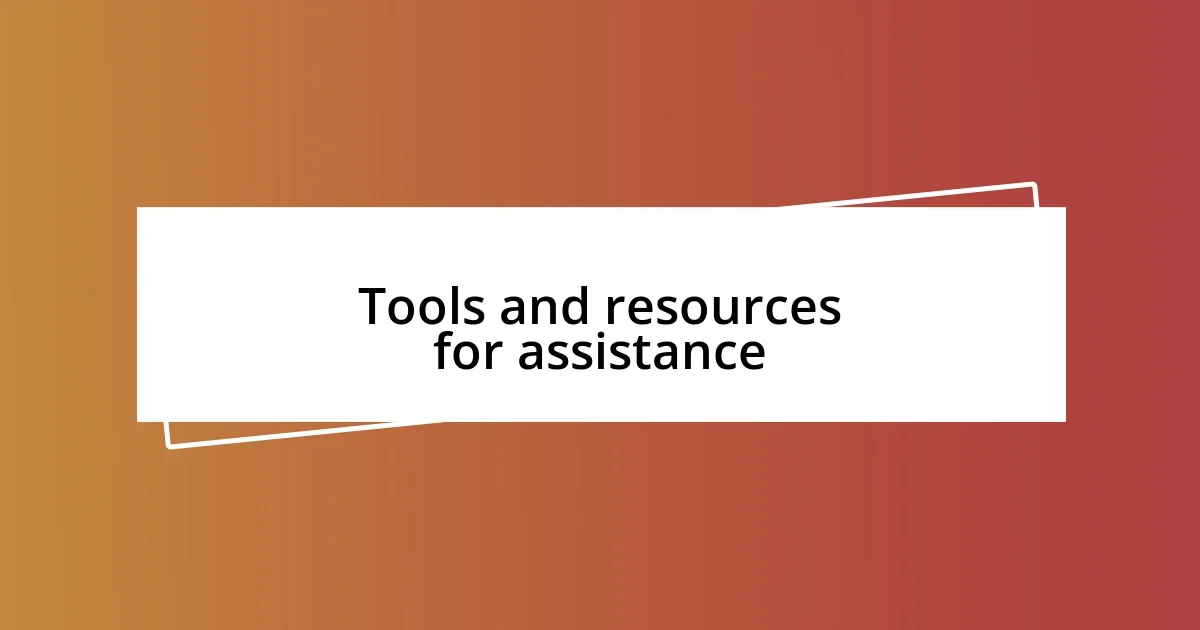
Tools and resources for assistance
When it comes to navigating international regulations, there are a handful of tools that have consistently served me well. For instance, I cannot recommend enough the use of regulatory compliance software. Just the other day, I used a platform that integrates updates from various jurisdictions, and it saved me hours of sifting through irrelevant information. It made me think—how often do we underestimate the power of technology in simplifying our work?
Moreover, turning to online communities can be a game changer. I vividly remember a time when I faced a particularly confusing licensing requirement for a project in Europe. A quick post in an international business forum connected me with a professional who had tackled the same challenge. The response was immediate and collaborative, reinforcing my belief that there’s strength in numbers. Have you ever reached out for help, only to find a wealth of knowledge right at your fingertips?
Lastly, don’t overlook the value of webinars and workshops hosted by industry experts. I attended a recent seminar focused on compliance changes in emerging markets, and it was enlightening. Not only did I gain practical insights, but I also felt energized by the shared enthusiasm of others in the field. Isn’t it invigorating to learn alongside fellow professionals chasing the same goals? Investing time in these resources can significantly enhance your understanding and preparedness for navigating the complex world of international regulations.
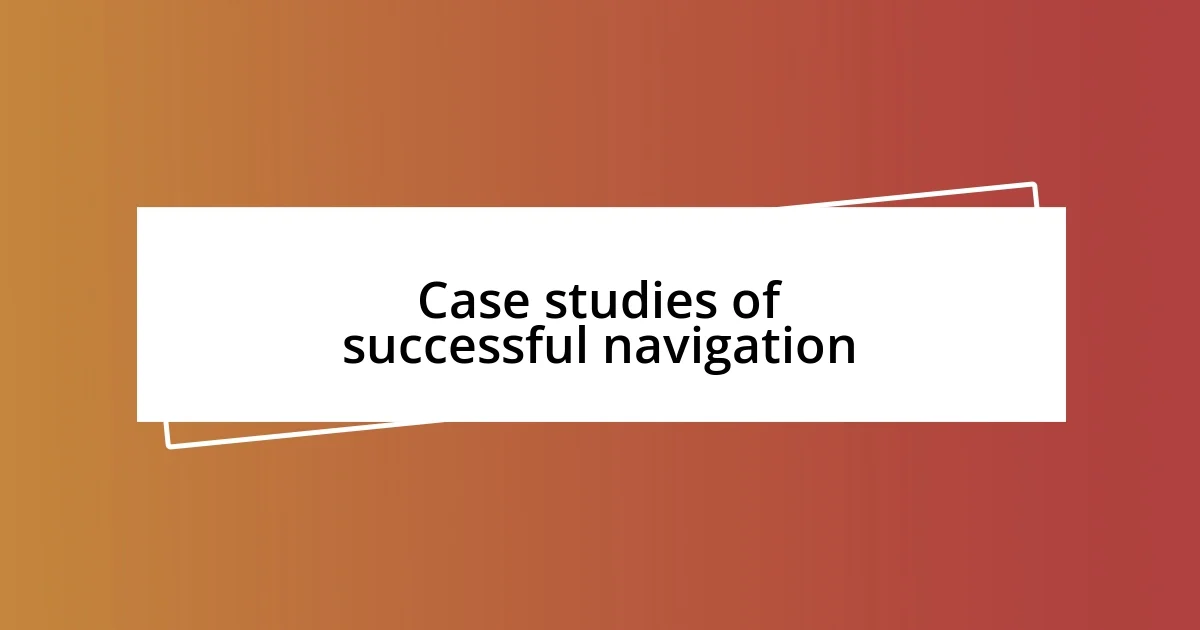
Case studies of successful navigation
One of my standout experiences was when I worked on a project that required compliance with multiple regulatory frameworks across Asia. I remember feeling overwhelmed as I tried to understand the nuances of each country’s laws. However, I reached out to a former colleague who had successfully navigated similar challenges. His advice not only clarified my path but also boosted my confidence. That connection illuminated the importance of network support. Have you ever had someone step in to shine a light on a complicated situation?
Another instance that stands out involved an unexpected audit of our operations in South America. Initially, I panicked at the thought of regulatory repercussions. Instead of letting fear dictate my actions, I gathered my team for a brainstorming session, where we pooled our knowledge. Together, we identified potential gaps and swiftly crafted a plan that satisfied the auditors. There’s something incredibly empowering about collaborating with others to meet compliance demands. Can you recall a time when teamwork turned a daunting task into a manageable solution?
I also recall a notable case of successful navigation when we decided to enter the European market. We meticulously researched and charted our course through the myriad regulations. What struck me was the satisfaction of unpacking what initially felt like an insurmountable challenge. It turned into an opportunity for growth and learning. I’ve learned that challenges often reveal hidden strengths and knowledge. Have you ever discovered something new about yourself while tackling an obstacle?
